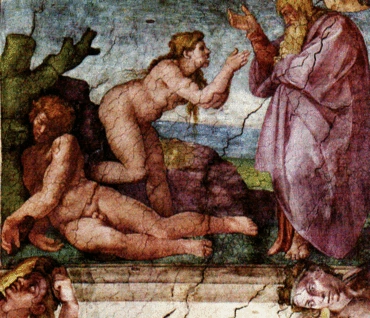Erläuterung zu Genesis 2:25
原作者: Brian David (机器翻译成: Deutsch)

Trotz ihres erniedrigten geistigen Zustands waren die Menschen, die durch den Mann und die Frau dargestellt wurden, immer noch himmlisch, immer noch in einem Zustand der Liebe zum Herrn. Die Vorstellung der Nacktheit steht für ihre Unschuld, und das Fehlen von Scham bedeutet, dass sie noch unberührt vom Bösen waren.
Es gibt auch eine kompliziertere Bedeutung von "nackt". Kleidung steht für wahre Ideen, die im Gedächtnis gespeichert sind; die meisten von uns "tragen" solche Ideen, um sich selbst zu schützen und um die Menschen davon abzuhalten, unsere bösen Lieben zu sehen. Die himmlischen Menschen hingegen haben ein Verständnis für das Wahre, das aus der Liebe in ihrem Herzen erwächst, und brauchen keine wahren Ideen in ihrem Gedächtnis zu speichern. Dies wird auch durch die Tatsache dargestellt, dass der Mann und die Frau nackt waren.
(参考: Himmlischen Geheimnissen 163, 164, 165)
Arcana Coelestia#1733
1733. 'Possessor of heaven and earth' means the conjunction of the Internal Man, or Jehovah, with the Interior and the Exterior Man. This is clear from the meaning of 'heaven and earth'. That which is interior in man is called 'heaven', and that which is exterior 'earth'. The reason heaven means that which is interior in man is that man as regards interior things is an image of heaven, and so a miniature heaven. The Lord's Interior Man primarily is heaven, for the Lord is the All in all of heaven, and thus heaven itself. The exterior man's being called 'the earth' follows as a consequence of this. Here also is the reason why 'the new heaven and the new earth' described in the Prophets and in the Book of Revelation is used to mean nothing other than the Lord's kingdom and every person who is the Lord's kingdom, that is, who has the Lord's kingdom within him. As regards heaven and earth having these meanings, see 82, 911, for heaven, and 82, 620, 636, 913, for earth.
[2] That 'God Most High, Possessor of heaven and earth' here means the conjunction of the Internal Man with the Interior and Exterior Man in the Lord becomes clear from the consideration that the Lord as regards the Internal Man was Jehovah Himself; and because the Internal Man or Jehovah guided and instructed the External Man - as the Father did the Son - the External Man considered in relation to Jehovah is therefore called the Son of God, but in relation to the mother the Son of Man. The Lord's Internal Man, which is Jehovah Himself, is that which is here called 'God Most High', and until complete conjunction or union had taken place it is called 'Possessor of heaven and earth', that is, Possessor of all that resided in the Interior and Exterior Man, which, as has been stated, is here meant by 'heaven and earth'.






